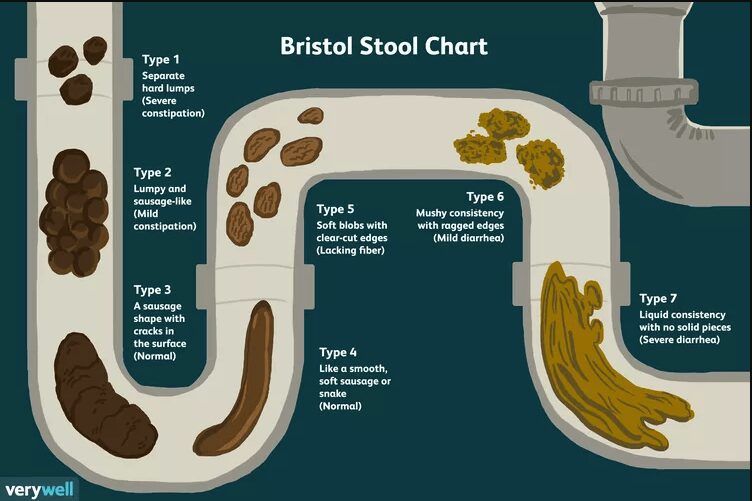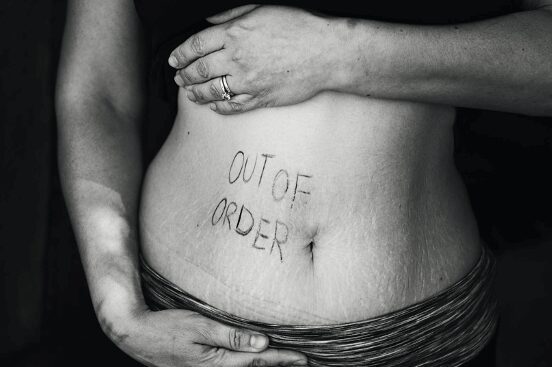By Michelle Shapiro and Nicki Parlitsis | Read Time: 10 Minutes
What is Optimal Digestion?
A healthy gut and optimal digestion can influence our mental health, immune system, and many other body functions. We can improve our digestion and gut health through foundational changes to our nutrition and lifestyle.

How to Know if Your Poop is Healthy
Bowel movements (BMs) should ideally occur 2-3 times per day, and are fully formed but not difficult to pass without straining. Types 3 and 4 on the Bristol Stool Chart (shown above) would be considered an optimal consistency and medium-brown color, with no blood or mucus in the stool.
An ideal poop should not be painful or take too long, and you should feel a sense of complete elimination.
You should not be chronically experiencing symptoms such as constipation, nausea, diarrhea, indigestion, acid reflux, abdominal pain, bloating, gas, and belching.
What to do When Digestion is Not Normal?
It’s always important to remember that anxiety and stress can worsen digestive issues, so including a comprehensive approach is important. This includes addressing your mental health (therapy, journaling, meditating, etc.) along with the other factors that are listed in this series (hormones, sleep, trauma, environment, etc.). If your GI concerns are chronic, painful, and/or concerning, please see a Gastroenterologist to rule out a more serious underlying condition!
Improving the gut microbiome with a healthy diet can be pivotal in breaking this anxiety-digestion cycle.

10 Steps to Improve Digestion and Gut Health
1. Eat enough fiber (25-35 grams per day)
Most people have a “sweet spot” for fiber – not too much but not too little. If you’re trying to increase fiber intake, do so gradually and increase your water intake as well to avoid constipation.
Fiber can be found in fruits, vegetables, and whole grains. Loose stools can be improved by increasing soluble fiber (oats, chia and flax seeds, fruits, lentils), while constipation may be relieved by both soluble and insoluble fiber (leafy greens and other vegetables, squash, whole grains).
2. Drink water (at least half your body weight in ounces)
Sometimes water alone is not enough to increase our hydration, especially if you live a very active lifestyle. In these cases, try adding electrolytes to your water as well.
(Bumbleroot foods electrolyte packets – 10% off with code WELLNESSMAP)
3. Eat fermented foods
Fermented foods provide fuel for the good bacteria in our gut, and provide many health benefits. Look for things like miso paste, kimchi, kefir, tempeh, and pickled veggies. Real sourdough bread is also fermented, but look closely at the ingredients to determine if it is true fermented sourdough or a look-alike.
Genuine sourdough ingredients include only flour, water, salt, and possibly some other natural ingredients. They may list “sourdough starter” as well. If it contains additives, yeast, or leavening (e.g. baking powder), then it is not sourdough bread.
4. Avoid food intolerances
If there are foods that you do not tolerate well, they can be irritating the lining of your gut. Sometimes it’s important to avoid these foods until our inflammation and digestive issues are healed, and then we can add them back in.
Common foods include gluten, dairy, beans/legumes, and cruciferous veggies (broccoli, cauliflower, brussels sprouts). These may not be something you need to avoid permanently, but if they are causing distress then it is best to hold off or decrease the quantity.
5. Limit caffeine
Coffee can help to induce a bowel movement, but the ultimate goal is to be more reliant on our bodies and less so on external factors making us go. Research has shown that even a cup of decaf coffee seems to produce a BM, so switching to decaf in the morning can be a good first step! (It seems to be a combination of the heat and some other lesser known factors in the coffee bean itself).
Check out MUD\WTR coffee-alternative, an adaptogen drink that can help to increase energy and alertness without caffeine.
6. Shift away from the Standard American Diet (SAD)
The SAD includes high intake of pro-inflammatory fats along with low intake of fiber and whole food fruits and vegetables, which can lead to severe digestive concerns including colorectal cancer.
Switching to a whole-food-based diet of fruits, vegetables, whole grains, high-quality proteins, and anti-inflammatory fats (avocado, olive oil, coconut, salmon, tuna, mackerel, herring) can help to reduce inflammation, improve digestion, and reduce the severity of mental health conditions including anxiety and depression.
7. Create regular bowel habits
Even if you are not able to have a BM every day, your body can be “trained” to do so. Think of this as an adult version of potty training! Leave yourself time in the morning so you don’t feel rushed. First thing upon waking – and 10-20min after each meal – sit on the toilet for about 10min. If you cannot produce a BM at first, that’s okay.
The goal is to get your body used to this motion and train it to respond over the next few weeks. Propping your legs up with something like a Squatty Potty is beneficial to alleviate pressure on the colon and put your intestines in a proper position for elimination.
8. Use castor oil packs
Using a soaked towel or specially-made pack with castor oil can be a helpful holistic remedy for improving digestion and detoxification processes.
The pack goes on the stomach in the area of the liver or intestines and wraps around until secure. This can be done before bed so the pack can sit overnight.
(Queen of Thrones castor oil packs – 10% off with code MichelleShapiroRD10)
9. Maintain a consistent morning routine
Having a consistent routine can play a huge role in maintaining consistent digestion. Do you ever notice how going on vacation seems to mess up the process? This may be due to stepping outside of your normal routine. This includes going to bed, waking up, using the bathroom, and even eating at the same times each day.
10. Use breathing techniques
Holding the breath can be a symptom of anxiety. This can create tightness in the pelvic floor, resulting in impaired motility and digestive issues. Taking time each day to meditate or focus on your breathing, especially in the bathroom, can be key in resolving these problems.

Work with the Right Practitioner to Improve Digestion
Some providers that can help to improve digestive concerns are gastroenterologists, registered dietitians, pelvic floor therapists, mental health providers, and hypnotherapists. (Head to our practitioner directory for more!)
By working with one of our Registered Dietitian Nutritionists at Michelle Shapiro Nutrition LLC, you will receive personalized recommendations and one-on-one nutritional counseling to help you reach attainable goals in a way that fits your lifestyle.
Bottom Line
We can improve digestion by focusing on many different factors that affect gut health including diet, lifestyle, and our environment. It can be tempting to focus only on diet or only on lifestyle, but true healing comes from a combination approach.
Focus on one of these steps at a time to slowly improve your digestion in the short-term and overall gut health long-term!
References
- InformedHealth.org [Internet]. Cologne, Germany: Institute for Quality and Efficiency in Health Care (IQWiG); 2006-. What is an inflammation? 2010 Nov 23 [Updated 2018 Feb 22]. Available from: https://www.ncbi.nlm.nih.gov/books/NBK279298/
- Pahwa R, Goyal A, Jialal I. Chronic Inflammation. [Updated 2022 Aug 8]. In: StatPearls [Internet]. Treasure Island (FL): StatPearls Publishing; 2022 Jan-. Available from: https://www.ncbi.nlm.nih.gov/books/NBK493173/